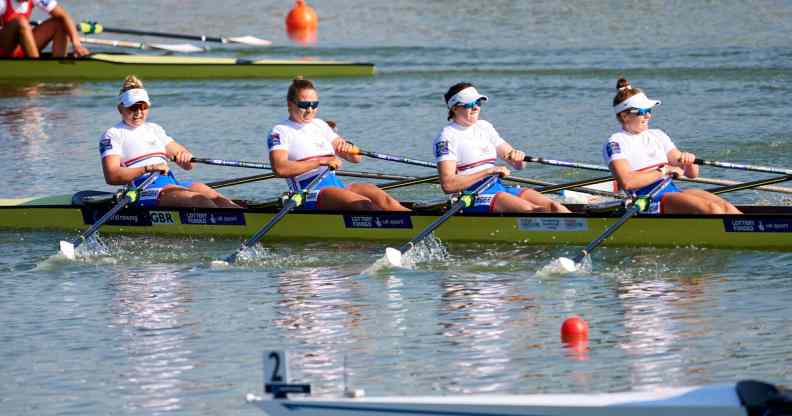British Rowing boss wants trans women excluded from women’s sport

(L-R) Jessica Marie Leyden, Lola Anderson, Georgina Megan Brayshaw and Lucy Glover of Great Britain competing at the World Rowing Championships. (Adam Nurkiewicz/Getty Images)
The chair of British Rowing has called for trans women athletes to be relegated to an “open” category.
British Rowing chair Mark Davies has urged the sport’s global governing body, World Rowing, to create a new open category, citing “concern that there is a threat to the hard-fought-for progress in women’s sport”.
World Rowing currently allows trans women to compete in women’s events if they reduce their testosterone to below five nanomoles per litre for 12 months.
However Davies wants the sport to follow the lead of swimming, which has all but banned trans women from competing with cis women.
As reported by ESPN, at the World Rowing Congress Davies said: “At British Rowing, we are about to publish an update to our transgender policy which will bring it in line with World Rowing’s.
“World Rowing is less protective of women’s sport than some other international federations such as [swimming body] FINA, which has adopted a policy of having open and women’s categories …
“Would World Rowing look at its policy out of concern that there is a threat to the hard-fought-for progress in women’s sport and consider following FINA’s lead?”
FINA, the International Swimming Federation’s, announced in June a new policy in which trans women who wish to compete must “have not experienced any part of male puberty beyond tanner stage 2, or before age 12, whichever is later”. Trans women who do not meet the criteria can compete in a new open category.
The decision has been condemned by trans athletes, with swimmer and trans activist Schuyler Bailar calling it “transphobic”.
Trans sports bans ‘hurt women in sports’
Right now the future of trans inclusion is in jeopardy across sport, with the World Netball Federation, FIFA, World Athletics, British Triathlon and British Cycling all announcing reviews of their eligibility rules.
In August this year, the World Boxing Council announced new guidelines that effectively ban trans athletes from its competitions due to “serious health and safety concerns”.
It all comes after the International Olympic Committee dropped its trans inclusion policy, allowing sports to set their own rules, but advising that it now believes “performance is not proportional to your endogenous, in-built testosterone”.
A spokesperson for trans-led charity, Gendered Intelligence, noted that trans-exclusionary sports policies come amid “constant negative coverage of trans people from both the media and government” across the UK for several years.
Former prime minister Boris Johnson and former culture secretary Nadine Dorries both called for trans women to be excluded from women’s sports in the dying days of the previous administration.
Gendered Intelligence added: “Trans people are underrepresented in professional sport, with almost no out trans people competing at elite level around the world. Despite this, the widespread misinformation has prompted a substantial backlash, and sports bodies have been pressured by both anti-trans organisations and the government to exclude trans people entirely.”
The spokesperson highlighted that restrictions intended to exclude trans athletes only end up “hurting women’s progress and participation in sports”.
They said: “More cis women are excluded by these kinds of rules than trans women. Black women – like Caster Semenya, who has been excluded from her own category by recent guidelines – are disproportionately affected, as are women with differences of sex development (DSDs).
“Anyone who is concerned about fairness in women’s sport must recognise that guidelines that exclude trans women also exclude far more cis women.”
In recent days, a new study has been picked up by national press which suggests trans women have more muscle mass than cis women, but less than cis men.
The findings are the outcome of research which carried out by scientists at the University of Sao Paulo in Brazil. The scientists conducted a series of tests on 15 trans women who had been taking hormone therapy for an average of 14 years.
However Dr Channa Jayasena, clinical senior lecturer, Imperial College London, noted that none of the participants were athletes, and said it’s possible similar differences would be found among cis athletes.
Meanwhile previous studies have suggested testosterone, long associated with strength, isn’t even the reason for some performance differences in the first place.
PinkNews has contacted British Rowing and World Rowing for comment.

